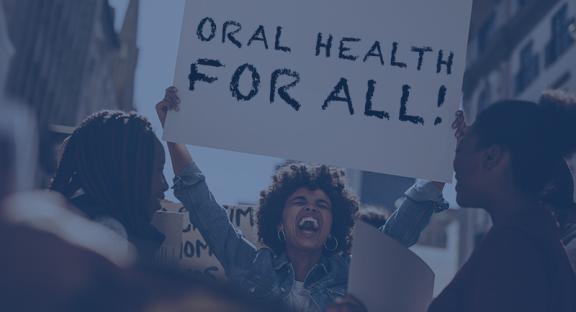WHO updates and improves global oral health strategy but must correct one major flaw
The updated WHO’s draft global strategy on oral health has vastly improved following FDI’s response but national dental associations should not be depicted as private sector. This misclassification MUST be corrected.

Following a public consultation process, the World Health Organization (WHO) made available the updated draft global strategy on oral health last week. The new version incorporates many of the suggestions made within the joint response that FDI submitted with the support of 65 organizations, including the addition of a new strategic objective on the health workforce.
Running from 24–29 January 2022, the 150th session of WHO’s Executive Board (EB150) will discuss the updated version of the global strategy on oral health (EB150/7, Annex 3). FDI commends many of the changes made to the strategy, viewing them as necessary to securing a more comprehensive and integrated oral health response. However, national dental associations are incorrectly depicted as private sector in the new version, when in fact professional bodies are a core element of civil society as recognized by WHO on many occasions, and we urge for this misclassification to be corrected.
A new focus on the health workforce for oral health
In line with Vision 2030’s Pillar 3 Building a resilient oral health workforce for sustainable development, FDI’s joint submission asked for a new strategic objective on the [Oral] Health Workforce, given the complex and comprehensive actions needed to optimize the health workforce to meet people’s oral health needs.
The new strategic objective on Health Workforce brings in a strong focus on competency-based education, innovative planning models, and both intra- and interprofessional collaboration. For this, the scope of practice of the different health professions involved in oral health promotion and oral healthcare needs to be defined in the context of a wider team approach, and the referral mechanisms must be reinforced.
This objective will need to address how current payment system models for oral health providers can be reformed to encourage a shift towards prevention in oral healthcare.
Stronger language on the associations with NCDs and sustainability
During the consultation phase, FDI commented that the strategy would benefit from a more comprehensive description of all the implications that the associations between oral health and general health have for health systems. The new version now specifies the co-morbidity burden of oral diseases with other noncommunicable diseases (NCDs), highlighting the link between periodontal disease and conditions such as diabetes and cardiovascular disease. Moving forward, as reflected in FDI’s recent briefing note with the NCD Alliance, it is important for poor oral health to be also presented as an NCD risk factor in itself, given the influence it can have in disease and treatment outcomes.
FDI also suggested a new guiding principle on sustainability given the implications it has across the different elements of the strategy, and the responsibility that WHO and Member States have towards promoting a sustainable oral health response. Instead of a new principle, the updated strategy now includes a standalone paragraph to raise awareness about the environmental importance of phasing down the use of dental amalgam, reducing the use of natural resources, and improving waste management.
Within the context of sustainability, we asked for reference to the role of dentistry in efforts to reduce antimicrobial resistance (AMR), including through dental infection prevention and antibiotic stewardship – as dentists currently prescribe up to 10% of antibiotics for human use worldwide. This is still not acknowledged in the new version, despite an implicit reference to AMR when talking about the impact of COVID-19 on essential oral health services, including through an increase on antibiotic prescriptions.
On a positive note, however, there is now more attention given to the social determinants of oral health; different public policies to reduce sugar intake and tobacco/alcohol use have been specified; more information on noma, a neglected oral disease, has been provided; and there is explicit mention of the high out-of-pocket payments and catastrophic health expenditure associated with oral healthcare specifically.
National dental associations are members of civil society
While most of the developments in the strategy have been very positive, there is one big setback in terms of recognizing the role that the oral health community plays in society. WHO has always recognized professional bodies as members of civil society, and FDI doesn’t understand why “National dental associations and other oral health professionals organizations” are categorized under private sector and is calling for this misclassification to be rectified.
FDI has a membership of almost 200 organizations, most of them national dental associations, who are independent and not-for-profit organizations promoting oral health to advance public health efforts in their countries and regions. For instance, many national dental associations, such as in New Zealand or Thailand, have been very active in implementing public policies to reduce sugar consumption. We therefore urge WHO to correct this flaw and put the paragraph on national dental associations and other oral health professionals organizations under the category of civil society, NOT private sector.
What’s next?
The updated strategy will be discussed and submitted for approval at the EB150 next week, where FDI will be delivering a statement summarizing our main feedback. Once approved by the Executive Board, the updated strategy may be further revised and will be submitted for final adoption at the 75th session of the World Health Assembly in May 2022.
Moreover, in the coming days, FDI will be sharing with its members a full analysis of the updated strategy against the recommendations within FDI’s joint response, encouraging our network to further support the development and implementation of WHO’s strategy and it subsequent action plan for oral health and monitoring framework.
Would you like to contact us about this? You can write us at advocacy@fdiworlddental.org.
